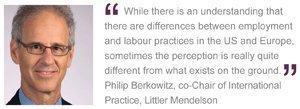USA Report 2011: Doing business in and through the US
With the eurozone hanging in the balance, European investors continue to look to foreign markets for opportunities that are unavailable domestically, and the US is growing in favour
Iberian investment in the US has seen a marked increase over the past few years. This is due in part to Europe’s ongoing economic crisis, but also investors’ desire to expand strategically into a stable market environment still with growth prospects. More recently, say lawyers, these investments have been concentrated in Florida, the Northeast and the West.
“The US is an attractive market due to the size of its population and average per capita income, the availability of government funding for certain infrastructure and cleantech projects, and the stability and reliability of its legal system,” says Xavier Ruiz, Partner at law firm K&L Gates. Businesses view this market opportunistically, approach it in a strategic and sophisticated way, and are responding to economic conditions as they evolve and develop, say lawyers.
The technology and pharmaceutical sectors, among others, have seen significant investment. But three industries stand out as most active: banking and finance, infrastructure and renewable energy.
Finance models
Brickell Avenue, Miami, home to the largest concentration of international banks in the US, is also now home to all the major Spanish banks with a number of the best-established players now expanding nationally. Banco Popular, Banco Sabadell and Santander are only the most obvious arrivals, while Portugal’s Banco Espírito Santo has a prominent banking and real estate presence.
Banking activity itself, previously mostly confined to New York, has also moved inland with a more nationalised focus, with Banco Bilbao Vizcaya Argentaria (BBVA), for example, especially active in the South in Alabama and Texas. This is indicative of Spanish banks’ focus on the Hispanic market, and the flow of funds between the US, Mexico and Central America.
As finances at State, Municipal and Federal Government level worsen, there is a major need to upgrade infrastructure in the US. Since 2008/2009, the focus has been on the more traditional European PPP model.
“The companies that are really adept at doing those projects and understanding how they are structured are the Europeans, in particular the big Spanish construction firms,” says Yosbel A Ibarra, shareholder at Greenberg Traurig.
“With all levels of government entities exploring PPPs and other alternative structures, Spanish businesses with experience in the relevant industries are capitalising on these opportunities,” agrees Victor M Alvarez, Partner at White & Case in Miami.
Interest and investment into infrastructure is particularly focused on those states where there is an interest to develop a PPP model that is consistent with, and similar to, what Spanish companies are used to, says Luis J Perez, Partner at Hogan Lovells in Miami.
Spanish construction firms are finding that their experience with concession-based projects positions them favourably within the US market, one that historically has relied on public funding for infrastructure instead of private capital.
Renewable energy (including wind, thermo-solar and photovoltaic energy) has seen increasing investor interest, particularly solar and wind projects in California, Arizona and New Mexico, and also with the evident commitment by the Obama Administration will continue to develop say lawyers.
And it is not just the big companies that are heading Stateside. From banks to construction companies to family-owned exporters. “You now see more mid-level companies that have an interest in the market,” says Fernando C Alonso, Partner at Hunton & Williams in Miami.
As to how investments are being made, Iberian businesses normally structure their investment through acquisitions (sometimes acquiring less than all of the equity interests of the target company) or through the formation of a local subsidiary: financial institutions and the renewable energy sector mostly expand their operations through strategic acquisitions, and infrastructure through acquisitions and increasingly joint ventures.
Corporate structures
Traditionally, Delaware has been the jurisdiction of choice for incorporation. It has a very predictable business legal structure, offers efficiency, flexibility and predictability; and, says Perez at Hogan Lovells, has a very strong judiciary that understands and has a very consistent history of interpreting business law cases.” Although, contrary to popular belief, says Ruiz at K&L Gates: “Delaware is not a tax haven jurisdiction.”
However, many other states have developed a strong body of business and investment law, so more companies are incorporating in New York or Florida, for example. “It’s a mixed bag,” says Alonso at Hunton & Williams. “We recently assisted a mid-level company entity to establish in Georgia, and another to establish in Virginia.” From a foreign investor standpoint, he says, “Delaware might be the location to incorporate your entity, but it doesn’t mean you would set up operations there.”
The choice of jurisdiction has many variables depending on where investors are looking to find or buy a business, set up operations or the location of the actual project.
“Businesses should headquarter their operations wherever best suits their business goals and activities,” says S Todd Crider, Partner at Simpson Thacher & Bartlett’s São Paulo and New York offices.
Establishing a business in the US is not without its challenges, lawyers caution. “Spanish companies come to the US and realise that they are not dealing with one monolithic Government, but with the Federal government, over 50 State governments and innumerable Municipal governments,” says Ibarra at Greenberg Traurig.
Differences in labour and employment practices also raise challenges. “While there is an understanding that there are differences between employment and labour practices in the US and Europe, sometimes the perception is really quite different from what exists on the ground,” says Philip Berkowitz, co-Chair of the International Practice of national labour firm Littler Mendelson.
Among others, the US does not have a system of labour courts, and employment contracts are not required by US law; not to mention abiding by the laws on discrimination, harassment and retaliation.
“A new employer coming to the US can actually put in place some very simple policies, procedures, and practices, and educate themselves on the laws here, and in doing so they can preserve the flexibility they need to run their workplace,” he adds.
 Navigation
Navigation
Establishing a foothold in the US not only facilitates navigation of the US market, but also that of inbound/outbound investment throughout the Americas. “The US is a sensible location when the target market is North America (ie, the US, Canada and Mexico), due to the benefits afforded by NAFTA, under which most products can circulate among these three countries free of any customs and other duties,” says Ruiz at K&L Gates.
Miami, in particular, is a favoured entry point into the US, but also considered a strategic gateway to Latin America. “If you look at some of the Spanish companies that have established here they are looking beyond Miami to the rest of the US and to Latin America,” says Alonso at Hunton & Williams. “If you have pan-regional business in different countries, Miami continues to be the place from which to base your operations.”
US multinationals have been using Miami for years to headquarter their Latin American operations; and many US companies based elsewhere in the US have their Latin American centres in Miami. With its geographical location, airport connections and Spanish/Portuguese-speaking employment force. “It is the perfect Petri dish to try out projects”, says Ibarra at Greenberg Traurig.
Iberian companies have proved their success in investing abroad, and with the US actively encouraging foreign investment, Iberian investment into the US shows no sign of stopping. However, the possible knock-on effects of the precarious state of the eurozone on Iberian operations in the US and/or Latin America remains to be seen.












